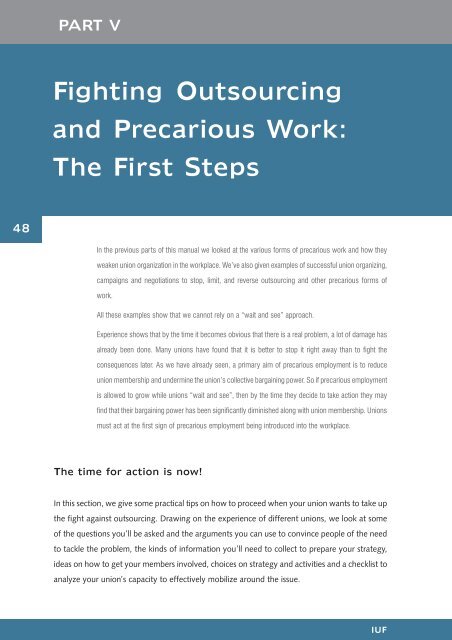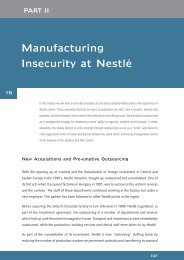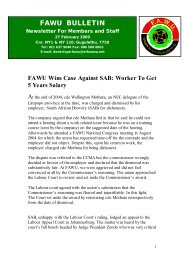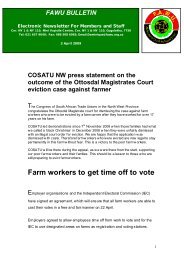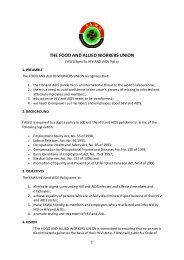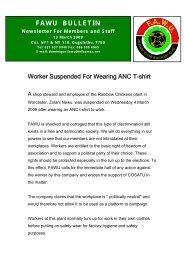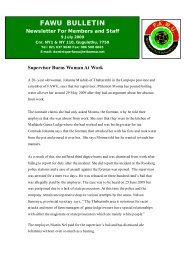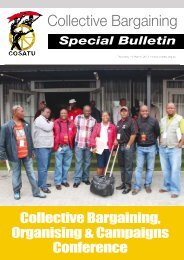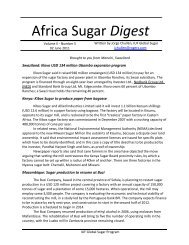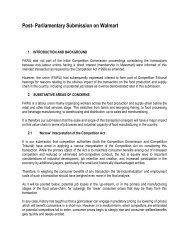PART V: Fighting Outsourcing and Precarious Work: The First Steps
PART V: Fighting Outsourcing and Precarious Work: The First Steps
PART V: Fighting Outsourcing and Precarious Work: The First Steps
Create successful ePaper yourself
Turn your PDF publications into a flip-book with our unique Google optimized e-Paper software.
48<br />
<strong>PART</strong> V<br />
<strong>Fighting</strong> <strong>Outsourcing</strong><br />
<strong>and</strong> <strong>Precarious</strong> <strong>Work</strong>:<br />
<strong>The</strong> <strong>First</strong> <strong>Steps</strong><br />
In the previous parts of this manual we looked at the various forms of precarious work <strong>and</strong> how they<br />
weaken union organization in the workplace. We’ve also given examples of successful union organizing,<br />
campaigns <strong>and</strong> negotiations to stop, limit, <strong>and</strong> reverse outsourcing <strong>and</strong> other precarious forms of<br />
work.<br />
All these examples show that we cannot rely on a “wait <strong>and</strong> see” approach.<br />
Experience shows that by the time it becomes obvious that there is a real problem, a lot of damage has<br />
already been done. Many unions have found that it is better to stop it right away than to fight the<br />
consequences later. As we have already seen, a primary aim of precarious employment is to reduce<br />
union membership <strong>and</strong> undermine the union’s collective bargaining power. So if precarious employment<br />
is allowed to grow while unions “wait <strong>and</strong> see”, then by the time they decide to take action they may<br />
find that their bargaining power has been significantly diminished along with union membership. Unions<br />
must act at the first sign of precarious employment being introduced into the workplace.<br />
<strong>The</strong> time for action is now!<br />
In this section, we give some practical tips on how to proceed when your union wants to take up<br />
the fight against outsourcing. Drawing on the experience of different unions, we look at some<br />
of the questions you’ll be asked <strong>and</strong> the arguments you can use to convince people of the need<br />
to tackle the problem, the kinds of information you’ll need to collect to prepare your strategy,<br />
ideas on how to get your members involved, choices on strategy <strong>and</strong> activities <strong>and</strong> a checklist to<br />
analyze your union’s capacity to effectively mobilize around the issue.<br />
IUF
<strong>Outsourcing</strong> has emerged as one of the key management<br />
strategies for weakening <strong>and</strong> undermining union strength.<br />
It takes different forms in different countries <strong>and</strong> even within<br />
single plants. To tackle the problem effectively, you need to<br />
carefully plan your strategy according to your local situation.<br />
This includes your own strengths <strong>and</strong> weaknesses <strong>and</strong> your<br />
members’ needs <strong>and</strong> readiness to act, as well as your own<br />
managements’ attitude, strategy <strong>and</strong> plans.<br />
This section can only offer ideas on first steps if your union is starting to<br />
take up the problem. More advanced strategies will have to be developed<br />
in the course of your own activities.<br />
OUTSOURCING AND CASUALIZATION IN THE FOOD AND BEVERAGE INDUSTRY<br />
49
50<br />
<strong>PART</strong> V <strong>Fighting</strong> <strong>Outsourcing</strong> <strong>and</strong> <strong>Precarious</strong> <strong>Work</strong>: <strong>The</strong> <strong>First</strong> <strong>Steps</strong><br />
Why fight it? convincing members <strong>and</strong><br />
colleagues<br />
<strong>Outsourcing</strong> is a complex process. Its negative consequences are not always immediately obvious.<br />
When they do become visible, the process is often well advanced. Union leaders must explain to<br />
their members <strong>and</strong> activists why this is an urgent issue requiring collective action. Management<br />
everywhere has a common stock of arguments to justify outsourcing <strong>and</strong> casual labour. Convincing<br />
people of the need for action means taking on the arguments that management uses to justify<br />
these practices. <strong>The</strong>y have become so widespread that you may even hear them echoed by<br />
those you work with when you raise the issue!<br />
Here are some of the main arguments unions typically meet with <strong>and</strong> how you might respond.<br />
“It’s none of your business”<br />
Management claims it is their prerogative to hire <strong>and</strong> use people in any way they see fit, <strong>and</strong><br />
tells us it’s not our business. <strong>The</strong>y can, <strong>and</strong> do, say the same about wages, work organization,<br />
gender policy, <strong>and</strong> virtually everything which affects workers.<br />
It IS our business, because it affects the job security, working<br />
conditions <strong>and</strong> union organization of everyone at our workplace!<br />
“It’s not part of our core business”<br />
When work is outsourced, we’re typically told, “This is just about the canteen, it’s not part of<br />
our core business.” Later, we hear the same about cleaners, <strong>and</strong> security, <strong>and</strong> maintenance.<br />
Tomorrow it could be the warehouse, or the drivers, or loaders, or sales, or office staff, or packaging<br />
… <strong>The</strong> truth is that in practice there are no limits. All work can <strong>and</strong> will be made more precarious<br />
if unions don’t stop it through organization <strong>and</strong> negotiation. In many workplaces the process has<br />
already penetrated into “core production” – workers find themselves working on the same<br />
production line, but under different conditions. Many companies in the food <strong>and</strong> beverage<br />
sector are implementing continuous restructuring as part of the drive for greater flexibility. Under<br />
continuous restructuring, the “core” is constantly changing. <strong>The</strong> real question we need to ask is<br />
whether the company could function without all those services <strong>and</strong> tasks that are described as<br />
“auxiliary” or “not core business”. Imagine your workplace without a canteen, without cleaners,<br />
IUF
maintenance <strong>and</strong> repair workers, security, drivers, loaders…. <strong>The</strong> fact is that all of these workers<br />
contribute to the products that the company sells, <strong>and</strong> without them the company could not<br />
function. This means that the “core versus non-core” is a false distinction. For unions it’s important<br />
to regard all of these tasks as part of the workplace, <strong>and</strong> so all of the workers involved must be<br />
union members. If the management disagrees, then the union has to fight to make them agree.<br />
If the law states that these workers are not “regular” workers <strong>and</strong> so cannot be union members,<br />
then it is the law that must be changed, not the union’s position.<br />
All work that goes into the products sold by the company is “core”!<br />
“We don’t want to employ unqualified people like cleaning<br />
staff…”<br />
<strong>The</strong> fact is that the company DOES employ them! <strong>The</strong> only difference is that outsourced workers<br />
are employed under inferior pay <strong>and</strong> conditions, with little or no job security.<br />
ALL employees make a vital contribution to the company’s product.<br />
Is management indifferent to the quality <strong>and</strong> supply of the raw<br />
materials which enter the production chain? or to what happens to<br />
the product once it leaves the factory? Producing <strong>and</strong> delivering a<br />
product to consumers is the result of a complex system of arranging<br />
work. <strong>The</strong> employer must assume responsibility for the terms <strong>and</strong><br />
conditions of employment of everyone whose activity throughout<br />
this system contributes to the product.<br />
“It’s only seasonal / It’s the nature of the business”<br />
Of course there are ups <strong>and</strong> downs in dem<strong>and</strong> <strong>and</strong> as well as in the supply of raw materials,<br />
especially with changing seasons. But something else is going on here, <strong>and</strong> companies are abusing<br />
the situation. Let’s take a closer look.<br />
A season is a clearly defined time of year, not a week when a big order has come in. What is<br />
“seasonal” about temporarily hiring a worker for a week in summer in a chocolate factory, or for<br />
three weeks in winter in a coffee-processing plant? Many workers are permanently on st<strong>and</strong>by,<br />
<strong>and</strong> never know when <strong>and</strong> for how long they will be employed.<br />
OUTSOURCING AND CASUALIZATION IN THE FOOD AND BEVERAGE INDUSTRY<br />
51
52<br />
<strong>PART</strong> V <strong>Fighting</strong> <strong>Outsourcing</strong> <strong>and</strong> <strong>Precarious</strong> <strong>Work</strong>: <strong>The</strong> <strong>First</strong> <strong>Steps</strong><br />
In cases like these, the truth is that workers are being “flexibly” hired <strong>and</strong> fired, directly or<br />
through an outsourcing arrangement, to compensate for poor planning or to meet the needs of<br />
“just in time” production.<br />
In other cases, “temporary workers” work all year on temporary contracts that are renewed<br />
every year or every couple of months. Management keeps workers in a dependent position <strong>and</strong><br />
creates a buffer for future possible market downturn.<br />
In both cases, the temporary, “seasonal” workers bear the costs of the market ups <strong>and</strong> downs<br />
which are an inevitable part of any business.<br />
<strong>The</strong> “seasonality” in many cases is pure fiction to mask the fact that the company is increasing<br />
its profit by passing on the market risks to workers. We’ve seen the example of the Nestlé<br />
factory in Malaysia in Part III, which is hiring “seasonal” workers at all times of the year. At<br />
Nestlé, all seasons are temp season!<br />
“It’s only a probationary period”<br />
In most countries, the length of a probationary period is clearly defined by the law. It generally<br />
cannot exceed 3 or a maximum of 6 months. A probationary period longer than this is clearly an<br />
excuse or cover for cost-cutting <strong>and</strong> dividing the workforce. Unless, of course, we’re all to wind<br />
up on permanent probation!<br />
Act to ensure that no probationary period is allowed to exceed the<br />
legal maximum!<br />
“We’ll transfer them soon to permanent, after…”<br />
We’ve all heard this before: Just wait a little bit, until we …<br />
l finish the restructuring<br />
l make the investment<br />
l close the years’ balance<br />
l appoint the new director<br />
l secure down a new sales contract<br />
l etc.<br />
IUF
Again, these are all part of normal business activity. If management is serious, why not sign an<br />
agreement on when, how many, <strong>and</strong> who exactly will be transferred to permanent status? If<br />
they refuse to sign, or even negotiate, they don’t believe it themselves!<br />
<strong>The</strong> time to solve the problem is now!<br />
Analyzing the problem – getting <strong>and</strong><br />
using the information you need<br />
<strong>The</strong> first thing you need to do when you want to challenge precarious employment relationships<br />
<strong>and</strong>/or fight outsourcing plans, together with convincing your members <strong>and</strong> colleagues that the<br />
struggle is both important <strong>and</strong> winnable, is to collect accurate, reliable information. Don’t trust<br />
rumors or “what management said”. Verify everything <strong>and</strong> get written documentation where<br />
possible. Keep good records of everything that happens around this issue: hiring practices,<br />
employment figures carefully dated over time, official management communications,<br />
correspondence, internal union meetings <strong>and</strong> meetings with management <strong>and</strong> violations of rights<br />
<strong>and</strong> intimidation of workers.<br />
What Kind of Information?<br />
Collecting information on outsourcing plans<br />
As soon as outsourcing plans at your workplace become known, try to find out everything you<br />
can! This includes<br />
a. any <strong>and</strong> all information about the outsourcing company: who are they, what is<br />
their legal status, what is their record of labour practices, where are their of-<br />
fices, where do they provide services?<br />
b. operational details of the planned restructuring <strong>and</strong> the resulting system:<br />
i. which departments are concerned<br />
ii. what positions are affected<br />
iii. What employment relationship is planned for the outsourced workers?<br />
iv. Who will be supervising these newly outsourced tasks?<br />
OUTSOURCING AND CASUALIZATION IN THE FOOD AND BEVERAGE INDUSTRY<br />
53
54<br />
<strong>PART</strong> V <strong>Fighting</strong> <strong>Outsourcing</strong> <strong>and</strong> <strong>Precarious</strong> <strong>Work</strong>: <strong>The</strong> <strong>First</strong> <strong>Steps</strong><br />
c. if workers on direct employment contracts are being transferred to employ-<br />
ment with the outsourcing company, what are the planned conditions of trans-<br />
fer:<br />
i. who will be transferred<br />
ii. how many will be transferred<br />
iii. what will happen to the others<br />
iv. what happens to the benefits these workers previously were entitled to or<br />
they have accumulated<br />
d. the planned terms <strong>and</strong> conditions of employment (wages, benefits, temporary<br />
or permanent contracts) for all outsourced tasks<br />
e. the position of the outsourcing company or companies regarding a three-way<br />
agreement between the management, the union, <strong>and</strong> the outsourced<br />
employee(s)<br />
f. a cost comparison for the tasks currently fulfilled by the company’s own de-<br />
partment <strong>and</strong> the cost under outsourcing (often it is NOT cheaper!)<br />
g. a draft or signed contract of the company with the outsourcing company<br />
Collecting Information on existing precarious work<br />
a. What forms of precarious work are currently in place at our workplace?<br />
i. how many workers are on temporary contracts at our workplace at different<br />
times of the year? Do they work constantly on temporary contracts?<br />
ii. how many workers are employed through other companies at our<br />
workplace?<br />
iii. what is their employment relationship?<br />
iv. which departments are concerned?<br />
b. Has it increased in the last years? (compare figures of permanent <strong>and</strong> precari-<br />
ous employment over the years. If permanent employment decreased, what<br />
has replaced it?)<br />
IUF
c. What is the situation of these workers<br />
o What are their main problems? (wages, benefits, insurance, health <strong>and</strong><br />
safety, employment status, overtime, etc.)<br />
o What are their working conditions – shift regime, working time, wages,<br />
health <strong>and</strong> safety, social benefits? How do these differ from regular<br />
workers?<br />
o Are they prepared to become union members?<br />
o What is the legal situation – can these employment relationships be<br />
challenged in court?<br />
Information needs vary with the circumstances!<br />
When the Nestle Union in Timashevsk found out about outsourcing plans at<br />
their plant, they drew up a list of what they needed to know, <strong>and</strong> where they<br />
planned to look for that information.<br />
What we need to know where to get it<br />
1. current costs of the particular work our management<br />
2. costs if outsourced to ABC Company our management<br />
3. CBA (if any), working conditions, work ABC Company<br />
schedules at X<br />
4. an individual employment contract from ABC Company<br />
ABC Company<br />
5. a list of positions affected our management<br />
6. the legal status of ABC Company ABC Company<br />
7. our management’s draft contract with ABC our management<br />
Company<br />
8. ABC Company’s record/reputation other unions/<br />
workers at other<br />
enterprises where<br />
ABC Company is<br />
active/Internet /<br />
ABC Company<br />
OUTSOURCING AND CASUALIZATION IN THE FOOD AND BEVERAGE INDUSTRY<br />
55
56<br />
<strong>PART</strong> V <strong>Fighting</strong> <strong>Outsourcing</strong> <strong>and</strong> <strong>Precarious</strong> <strong>Work</strong>: <strong>The</strong> <strong>First</strong> <strong>Steps</strong><br />
How to get the information you need if<br />
you are denied it<br />
Information denied is information to worry about!<br />
If you’re not getting it, management may be covering something up. Don’t give up asking for<br />
information. You have a right to it, <strong>and</strong> don’t stop reminding management that you know this is<br />
your right.<br />
l Enforce your information rights! Exert constant pressure <strong>and</strong> always request<br />
information in writing. Verbal requests are often ignored. Management may<br />
think twice about ignoring a written request.<br />
l While keeping pressure on management to provide information, you should<br />
also look for other information sources: your union members, the workers of<br />
the outsourcing company, your local, regional, national or other relevant union<br />
organization, the press, the internet [However, be careful: not all information<br />
you find on the internet is accurate, up-to-date or reliable. So you will need to<br />
cross check your information]. Make use of examples from other companies<br />
<strong>and</strong> other plants owned by the same company, both in your country <strong>and</strong> over-<br />
seas.<br />
l Insist that this is your legitimate concern. If there are clauses in your CBA re-<br />
stricting your access to such information, prepare to challenge them in future<br />
negotiations!<br />
l Challenge the abusive use of “commercial secrecy” or “business confidential-<br />
ity” to deny unions their legitimate right of access to information. Hold the<br />
company to their word: Many companies publicly proclaim their commitment<br />
to “openness” <strong>and</strong> “transparency” as part of “corporate social responsibility”.<br />
<strong>The</strong>se commitments should be put into practice!<br />
l Document the denial of information <strong>and</strong> keep it on record for future action.<br />
IUF
<strong>The</strong> most important task: convincing<br />
<strong>and</strong> mobilizing your members. Organize<br />
all workers at the plant!<br />
To succeed in stopping <strong>and</strong> rolling back outsourcing, you will need the support of your union<br />
members <strong>and</strong> of all workers at your workplace. To help members underst<strong>and</strong> the need to combat<br />
precarious work, they need to be constantly included in the process of fighting back.<br />
This concerns both direct, permanent employees AND the precarious, temporary workers! Even<br />
if they are denied the right to be union members, they should always be seen as POTENTIAL<br />
union members, <strong>and</strong> their rights should be high on the union agenda.<br />
Only if they see that your union is concerned about their situation will they underst<strong>and</strong> their<br />
interest in supporting the union!<br />
Winning Support from Union Members <strong>and</strong> <strong>Precarious</strong><br />
<strong>Work</strong>ers<br />
1. Education & awareness<br />
Union members should underst<strong>and</strong> that precarious employment is a threat to<br />
their job security <strong>and</strong> working conditions as well as being a threat to their<br />
union. However, it’s important that they see precarious employment as a man-<br />
agement strategy as a threat, <strong>and</strong> don’t see precarious workers themselves as a<br />
threat. <strong>Precarious</strong> workers are in that position because they’ve been denied<br />
their rights. So it’s crucial that union members fight against precarious employ-<br />
ment <strong>and</strong> fight for the right of precarious workers to job security <strong>and</strong> union<br />
membership. You will need to show people WHY this is an important issue. You<br />
can use examples from this h<strong>and</strong>book, organize training sessions, produce leaf-<br />
lets/pamphlets. Try to think of other ways of spreading information <strong>and</strong> stimu-<br />
lating thinking on the issue.<br />
2. Get their input<br />
Find out what people are most concerned about. Many times it’s what seems<br />
like small grievances that really illustrate the vicious nature of precarious work.<br />
OUTSOURCING AND CASUALIZATION IN THE FOOD AND BEVERAGE INDUSTRY<br />
57
58<br />
<strong>PART</strong> V <strong>Fighting</strong> <strong>Outsourcing</strong> <strong>and</strong> <strong>Precarious</strong> <strong>Work</strong>: <strong>The</strong> <strong>First</strong> <strong>Steps</strong><br />
3. Keep them informed<br />
Get all the information out to your members –never assume they’re informed<br />
unless you inform them.<br />
4. Involve all the members<br />
Think about activities people can join, for example signing a letter, wearing<br />
badges, contributing to information gathering, talking to other people in the<br />
plant or joining a meeting. Keep in mind what people are able <strong>and</strong> ready to do.<br />
5. Organize all workers, regardless of their status!<br />
Management will try to split the workers into different parts: core <strong>and</strong> periph-<br />
ery, permanent <strong>and</strong> temporary, men <strong>and</strong> women, old <strong>and</strong> young, long-term<br />
employees <strong>and</strong> newcomers, direct <strong>and</strong> indirect employees. Make sure people<br />
underst<strong>and</strong> that they can win this fight only if they are united! <strong>The</strong> goal must<br />
be to organize every worker as a union member.<br />
6. Union activities<br />
Some unions have assigned organizers to make contact with precarious work-<br />
ers <strong>and</strong> involve them in union activities, while other unions have formed “soli-<br />
darity committees” to work with precarious workers <strong>and</strong> assist them in organ-<br />
izing. <strong>Precarious</strong> workers are invited to join training sessions <strong>and</strong> to contribute<br />
articles or interviews to union newsletters. Joint meetings <strong>and</strong> other union ac-<br />
tivities that bring union members face to face with precarious workers are a<br />
vital step in building solidarity.<br />
7. Build trust <strong>and</strong> confidence<br />
<strong>Precarious</strong> workers may be concerned that they will lose their employment if<br />
the union takes action against precarious employment. We need to under-<br />
st<strong>and</strong> the risks faced by precarious workers <strong>and</strong> take their concerns seriously.<br />
<strong>Precarious</strong> workers are already insecure <strong>and</strong> vulnerable, <strong>and</strong> so we need to<br />
ensure that union members will fight to protect them against dismissal or any<br />
form of harassment or intimidation. It is crucial that organizing is based on<br />
mutual trust <strong>and</strong> respect, so that precarious workers are willing to take the risk<br />
of supporting the union, while union members are willing to act to support<br />
precarious workers’ right to regular employment <strong>and</strong> job security.<br />
IUF
Organizing & Mobilizing Union Members <strong>and</strong><br />
<strong>Precarious</strong> <strong>Work</strong>ers<br />
On 26 August 2004, the IUF-affiliated Australian Manufacturing<br />
<strong>Work</strong>ers’ Union (AMWU) signed a new national three-year collective<br />
agreement with Nestlé Confectionary Australia that significantly<br />
increased union rights <strong>and</strong> rolled back the use of precarious workers<br />
hired through labour agencies. Below are extracts from an interview<br />
with Jennifer Dowell, Assistant National Secretary of the Food<br />
Division of the AMWU <strong>and</strong> IUF Vice-President.<br />
What we did was that we set out a process to negotiate the<br />
enterprise agreement <strong>and</strong> we got together all the delegates<br />
from the three sites <strong>and</strong> we worked out what our log of claims<br />
was going to be. We talked about the problems of casualization<br />
<strong>and</strong> contracting out <strong>and</strong> it was a problem with most of the<br />
members. We put that on the log of claims <strong>and</strong> then took that<br />
out to the sites <strong>and</strong> the delegates <strong>and</strong> organizers explained to<br />
members what the union was trying to do to deal with this<br />
particular issue. <strong>The</strong> union got unanimous support on all three<br />
sites that their first option was to get rid of labour hire entirely<br />
<strong>and</strong> have everyone employed directly by Nestle, regardless of<br />
their contract of employment, but if that was unobtainable<br />
then we would take it a step at a time <strong>and</strong> we would enforce a<br />
restriction on the numbers.<br />
People’s concern was the use of non-permanent forms of labour<br />
was increasing on the sites <strong>and</strong> they had a view, in particular<br />
at the largest site, that permanents were leaving <strong>and</strong> their<br />
jobs were not being filled by permanent people, they were<br />
being filled by short-term casual. <strong>The</strong>re was a real concern<br />
that the use of non-permanent labour was growing.<br />
We consistently talked to the members, we had telephone hookups,<br />
we sent out newsletters, we did a status document so<br />
that after every meeting that we had for negotiations we would<br />
update the status document that showed exactly where we<br />
were up to on every one of the issues that was on our original<br />
log of claims. People knew what the company was saying yes<br />
to, what they were saying no to, <strong>and</strong> eventually through the<br />
process, which took almost 12 months, people made decisions<br />
as we went along as to whether they were items which they<br />
were going to die in a ditch over or whether they were items<br />
they were prepared to let go to another time. Things we got<br />
agreement to from the company, things they opposed, things<br />
they were prepared to discuss were reported. We got down to<br />
the issues that were important to all the sites <strong>and</strong> the labour<br />
hire issues were top of the list.<br />
OUTSOURCING AND CASUALIZATION IN THE FOOD AND BEVERAGE INDUSTRY<br />
59
60<br />
<strong>PART</strong> V <strong>Fighting</strong> <strong>Outsourcing</strong> <strong>and</strong> <strong>Precarious</strong> <strong>Work</strong>: <strong>The</strong> <strong>First</strong> <strong>Steps</strong><br />
Organizing & Mobilizing Union Members <strong>and</strong><br />
<strong>Precarious</strong> <strong>Work</strong>ers continued<br />
As part of the process the company was aware of the<br />
meetings we were having, they were getting constant<br />
feedback from us <strong>and</strong> the delegates about the position of<br />
the workforce, <strong>and</strong> the managers became very aware of the<br />
fact that the workforce was committed to fixing the labour<br />
hire problem <strong>and</strong> they knew that at the end of the<br />
negotiations if they didn’t deal with that issue they were<br />
going to have industrial disputes across all three sites at<br />
the same time. In fact, we got agreement from all the<br />
employees that we would initiate industrial action <strong>and</strong> that<br />
it would take place on all of the sites. <strong>The</strong> company decided<br />
that they really needed to discuss this matter properly. When<br />
we put it to them we put our proposal up because we could<br />
not get a blanket ban on labour hire, so we put this proposal<br />
up that restricted Nestle to a percentage <strong>and</strong> they ended<br />
up agreeing to that. Everyone agreed that next time round<br />
we will try <strong>and</strong> reduce it to a stage where they have to do<br />
something about the labour hire altogether.<br />
It [was] difficult, because even though you organize the<br />
labour hire workers, <strong>and</strong> we have done this consistently, it<br />
is very difficult because you never get them fully organized<br />
because they have such a huge turnover. You might have 20<br />
labour hire people on a site one week <strong>and</strong> the union might<br />
recruit all of the them, but the next week you might still<br />
have 20 labour hire people, but only 15 will be the same<br />
ones you had the last week. So, there is this constant thing<br />
of being afraid to join the union <strong>and</strong> terrified they won’t get<br />
any work if their employer knows they’ve joined the union<br />
<strong>and</strong> depending on who the labour hire company is, quite<br />
often they do terminate workers because they join a union,<br />
although they will never admit that. You can recruit the<br />
labour hire workers, but then Nestlé was not particularly<br />
worried about us recruiting them, in fact a lot of the mangers<br />
thought that was good for Nestlé because the union would<br />
then have to consider the labour hire people, <strong>and</strong> we wouldn’t<br />
be pushing so hard to get labour hire off the sites. But we<br />
educated both the labour hire people <strong>and</strong> the permanent<br />
workforce that it was best for both, in that we weren’t<br />
actually trying to get rid of the people who were working<br />
for labour hire, we were trying to get them jobs with Nestle.<br />
IUF
Choosing your strategy<br />
In each case you will have to determine the right strategy for your union <strong>and</strong> your situation.<br />
Unions pursue a variety of strategies, sometimes combining them in different ways. Here is a list<br />
of strategies unions have successfully used:<br />
1. Collective bargaining negotiations<br />
It is a basic principle of trade unionism that ALL changes affecting the organi-<br />
zation of work <strong>and</strong> the terms <strong>and</strong> conditions of employment must be negoti-<br />
ated through the collective bargaining process. Never fail to remind manage-<br />
ment that this principle is established in international law! Negotiations will be<br />
necessary in almost all situations. Everything is subject to negotiation. This<br />
includes, for example, the conditions of keeping the department in the com-<br />
pany, the conditions of regularizing precarious workers, <strong>and</strong> the conditions<br />
under which your union might accept negotiated restructuring. Be sure to pre-<br />
pare properly – these issues are as important as any other CBA negotiations!<br />
2. Continuous monitoring of existing clauses <strong>and</strong> ongo-<br />
ing bargaining<br />
After you have negotiated an agreement you need to monitor <strong>and</strong> enforce its<br />
implementation. Every agreement should contain a monitoring process! If the<br />
agreement contains your right to negotiate changes, follow-up must be se-<br />
cured. (See the example of the AMWU agreement in Part III).<br />
3. Legal action<br />
<strong>The</strong>re are situations when legal action can be successfully used to challenge<br />
outsourcing:<br />
a) when legislation in your country regulates outsourcing in a way that<br />
establishes limits to the process <strong>and</strong>/or gives union special rights in<br />
negotiating the process under which it is introduced <strong>and</strong> carried out. If the<br />
company violates these provisions, you should file a law suit.<br />
b) when the outsourcing company or the company violates the rights of the<br />
outsourced workers, you can put pressure on both companies through<br />
legal action <strong>and</strong> combine it with a campaign to regularize these workers.<br />
OUTSOURCING AND CASUALIZATION IN THE FOOD AND BEVERAGE INDUSTRY<br />
61
62<br />
<strong>PART</strong> V <strong>Fighting</strong> <strong>Outsourcing</strong> <strong>and</strong> <strong>Precarious</strong> <strong>Work</strong>: <strong>The</strong> <strong>First</strong> <strong>Steps</strong><br />
c) sometimes you can find legal loopholes to prove that these workers should<br />
legally be regular employees <strong>and</strong> their current employment status is in<br />
fact illegal (see the example from the Coca-Cola Union in Pakistan in Part<br />
III)<br />
4. <strong>Work</strong>place action<br />
Any campaign for the rights of outsourced <strong>and</strong>/or precarious workers or in<br />
resisting outsourcing naturally needs to build on your members’ readiness to<br />
fight. Different forms of activity in the workplace can be used creatively to<br />
build solidarity <strong>and</strong> pressure management in support of specific dem<strong>and</strong>s. This<br />
could include petitions, buttons/badges/pins, public protest meetings, work<br />
stoppages <strong>and</strong> strikes. <strong>The</strong>se can be used effectively in combination with other<br />
actions, e.g. organizing media coverage or solidarity action from other unions<br />
<strong>and</strong>/or the community. <strong>The</strong>se need to be planned carefully. Always bear in<br />
mind the possible reactions of management, the public, union members <strong>and</strong><br />
non-unionized workers!<br />
Carefully plan your campaign strategy in meetings before you start doing things.<br />
Make sure your members are informed about the next steps <strong>and</strong> the strategy<br />
behind them!<br />
5. Public campaigns<br />
<strong>The</strong>se can <strong>and</strong> should accompany activities for employment guarantees. Most<br />
people would readily underst<strong>and</strong> the need for job security. What many don’t<br />
underst<strong>and</strong>, however, is the extent to which transnational companies are sys-<br />
tematically undermining stable employment. This is where a media campaign<br />
is needed!<br />
Your media strategy must be closely incorporated with your campaign strategy.<br />
Include it in your campaign planning!<br />
IUF
6. Finding <strong>and</strong> working with coalition partners<br />
In the fight against precarious employment <strong>and</strong> outsourcing, you will need<br />
support from reliable allies who share your objectives <strong>and</strong> methods <strong>and</strong> under-<br />
st<strong>and</strong> that this is a common issue. <strong>The</strong>se include:<br />
l Your territorial or branch level union organization<br />
l Your union colleagues from other plants of the company<br />
l Other unions dealing with the same outsourcing company<br />
l <strong>The</strong> public – journalists interested in the topic, NGOs <strong>and</strong> local community<br />
organizations campaigning on labour rights, unemployment, urban poverty,<br />
youth organizing, etc.<br />
Analyse your strengths <strong>and</strong> weaknesses<br />
Before you start campaigning, have a clear picture of your strengths <strong>and</strong> weaknesses. Don’t get<br />
discouraged if you discover some weak points – use the opportunity to try to become stronger.<br />
Identifying weak areas should not prevent you from taking action. What is important is that<br />
there is an assessment <strong>and</strong> evaluation process as part of developing union strategies. Not a<br />
single union in the world would answer “yes” to all of the following questions.<br />
OUTSOURCING AND CASUALIZATION IN THE FOOD AND BEVERAGE INDUSTRY<br />
63
64<br />
<strong>PART</strong> V <strong>Fighting</strong> <strong>Outsourcing</strong> <strong>and</strong> <strong>Precarious</strong> <strong>Work</strong>: <strong>The</strong> <strong>First</strong> <strong>Steps</strong><br />
Try to honestly assess your strengths <strong>and</strong> weaknesses. Take notes on why<br />
you filled in which box. Discuss your weak points: what could you do to<br />
strengthen your position?<br />
1. Information gathering<br />
Do we regularly get the information we need from management?<br />
Do we have other sources of reliable information to check or challenge the information we<br />
get from management <strong>and</strong> compensate for information we don’t get?<br />
Do our union members report news <strong>and</strong> rumors to us?<br />
2. Analyzing<br />
Do we fully underst<strong>and</strong> the information we receive?<br />
Do we have possibilities to ask reliable <strong>and</strong> sympathetic resource persons for support?<br />
3. Information distribution<br />
Do we have enough bulletin boards at the plant?<br />
Do we have experience in distributing written information?<br />
Can we get support to produce written materials?<br />
Do we have financial or other resources to produce printed materials?<br />
Do we have the possibility to hold meetings in departments, for the whole plant?<br />
Do we have the right to freely communicate with union members?<br />
Do union members have the time to participate in meetings? Are they released from work<br />
for meetings?<br />
Are union members able <strong>and</strong> ready to attend meetings outside work?<br />
4. Mobilizing<br />
Do our union members consider the issue important?<br />
Are union members concerned enough to get active on the issue?<br />
Can we protect them from retaliation when they do become active?<br />
Do we have experience in organizing protest action?<br />
Do we have people who can contribute to actions (music, theatre, posters, etc.)?<br />
Do we have reliable contacts with potential supporters – other unions, NGOs, journalists?<br />
Are we able to present the issue to the public as justified <strong>and</strong> important?<br />
Do we have a solidarity or strike fund?<br />
Do we have resources needed to launch <strong>and</strong> sustain the campaign?<br />
xx x – ––<br />
IUF
5. Negotiating<br />
Is there space to negotiate on the issue<br />
Do we have negotiating experience?<br />
Can we get external support in negotiations (higher union bodies, experts, lawyers)?<br />
Can we get the right conditions for negotiating – enough time <strong>and</strong> preparation <strong>and</strong> a<br />
reliable negotiating partner who will stick to their commitments?<br />
Are we properly prepared – do we have the information, the arguments, the maximum <strong>and</strong><br />
minimum positions we want to reach?<br />
Will our members have the patience to support a lengthy negotiation process?<br />
If an arbitrator gets involved can we trust them?<br />
6. Legal issues<br />
Are their possibilities to legally challenge managements’ decisions / practice?<br />
Is the court likely to deliver a just ruling?<br />
Do we have the means to stick out a possibly lengthy process (lawyers, other costs)?<br />
Do we have the strength to use legal issues for campaigning?<br />
Can we enforce court rulings?<br />
Are the chances of a positive court ruling bigger than the chances of a ruling with negative<br />
consequences?<br />
Conclusions<br />
<strong>Steps</strong> 1-3 are essential preconditions for a successful fight.<br />
No amount of activism can compensate for an absence of reliable, accurate information. If you<br />
are not able to analyze the complex documents management sometimes provides, you might<br />
easily be tricked. Look for help!<br />
Maintaining constant communication with union members is critical to ensuring a successful<br />
fight. And should you win the fight, it’s important that union members <strong>and</strong> precarious workers<br />
are aware that the union was responsible for these gains.<br />
<strong>Steps</strong> 4-6 can help you discover the most suitable strategy for your particular situation. Discovering<br />
that you are stronger in certain areas <strong>and</strong> not others may help you determine which strategy to<br />
pursue.<br />
OUTSOURCING AND CASUALIZATION IN THE FOOD AND BEVERAGE INDUSTRY<br />
xx x – ––<br />
65
66<br />
<strong>The</strong> IUF<br />
<strong>The</strong> IUF is a global union federation composed of some 360 trade unions around the world<br />
which represent workers in the food <strong>and</strong> agricultural sectors, in hotels, restaurants <strong>and</strong> catering<br />
<strong>and</strong> in beverages <strong>and</strong> tobacco.<br />
Since September 2004, the IUF has been engaged in co-ordinated international union organizing<br />
<strong>and</strong> development activities within Nestlé <strong>and</strong> Coca-Cola through the Nestlé/Coca-Cola Global<br />
Organising Initiative, supported by LO Norway <strong>and</strong> the German FES. As of May 2006, with the<br />
support of the Dutch FNV, the initiative has exp<strong>and</strong>ed to include Unilever <strong>and</strong> Heineken. <strong>The</strong>se<br />
activities build on <strong>and</strong> strengthen the existing work in the regions, while providing continuity<br />
<strong>and</strong> enabling sustainability through the presence of dedicated regional co-ordinators.<br />
<strong>The</strong> regional co-ordinators can be contacted as follows:<br />
AFRICA<br />
Cuana Angula<br />
IUF Africa Regional Secretariat<br />
Traduna Centre, 5 th Floor<br />
118 Jorrisen Street<br />
Braamfontein 2017<br />
Johannesburg<br />
South Africa<br />
Tel: +27 11 339 43 91<br />
cuana.angula@mweb.co.za<br />
Siméon Dossou<br />
CSA-BENIN<br />
06 BP 1748<br />
Cotonou<br />
Bénin<br />
Tel: +229 90936057<br />
simeon.dossou@iuf.org<br />
ASIA/PACIFIC<br />
Hidayat Greenfield<br />
IUF Asia-Pacific Regional Secretariat<br />
377-383 Sussex Street, Room 5, 8 th Floor<br />
Labour Council Building<br />
Sydney NSW 2000<br />
Australia<br />
Tel: +61 2 9264 6409<br />
greenfield@iuf.org<br />
LATIN AMERICA<br />
Beatriz Sosa-Martínez & Ariel Celiberti<br />
IUF Latin America Regional Secretariat<br />
Wilson Ferreira Aldunate 1229/201<br />
11100 Montevideo<br />
Uruguay<br />
Tel: +598 2 900 74 73<br />
beatriz@rel-uita.org<br />
ariel@rel-uita.org<br />
SOUTH-EASTERN EUROPE<br />
Ildikó Krén<br />
Jokai utca 2<br />
H – 1062 Budapest<br />
Hungary<br />
Tel: +36 1 301 90 70<br />
ildiko.kren@iuf.org<br />
RUSSIA & CIS<br />
IUF General Secretariat<br />
Gisela Neunhöffer<br />
IUF Moscow Office<br />
Palace of Trade Unions, Room 34-27<br />
Leninskii Prospekt 42<br />
119119 Moscow<br />
Russian Federation<br />
Tel: + 7 495 938 86 17<br />
gisela.neunhoeffer@iuf.org<br />
Rampe du Pont-Rouge 8<br />
CH-1213 Petit-Lancy (Geneva)<br />
Switzerl<strong>and</strong><br />
Ron Oswald, General Secretary<br />
Jacqueline Baroncini, Nestlé Co-ordinator<br />
Tel: + 41 22 793 22 33<br />
jacqueline.baroncini@iuf.org<br />
IUF


